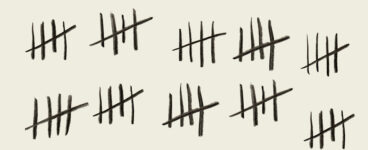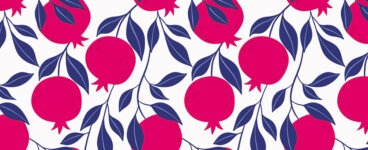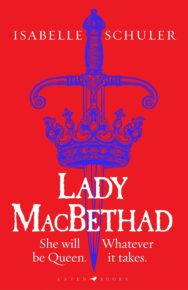‘More than a retelling, I wanted it to be a reclamation of a life that was far more expansive than the depiction Shakespeare gave her.’
Lady Macbethad reimagines the early life of Gruoch, wife of Macbeth, and inspiration for one of Shakespeare’s most memorable heroines. A novel that consciously shifts the dial on male-dominated history, Isabelle Schuler reclaims and celebrates the life of this remarkable woman in an impressive debut sure to delight readers of historical fiction and others alike. We spoke to her to find out more.
Lady Macbethad
By Isabelle Schuler
Published by Raven Books
Congratulations, Isabelle, on the publication of Lady Macbethad. How does it feel having the book reach readers and can you tell us a little bit about what readers should expect from the book?
This is perhaps one of the more surreal experiences I’ve ever had! I come from a performing background as an actress, so it feels so strange to create something and put it out into the ether, knowing people will be interacting with it but not necessarily having the same relationship with the audience that I did as a performer. Weird and wonderful!
Readers can expect a story full of passion, desire, ambition, destiny, betrayal, lust, and a respectable body count.
What is it about the character of Lady Macbeth that you felt deserved further exploration?
I’ve always struggled with the gendered language around ambition in Shakespeare’s play especially in his handling of Lady MacBeth, but when I discovered Gruoch – the real Lady MacBeth – and the incredible life that she had led, all before marrying MacBeth, I knew I had to give this character an origin story. While there is much allusion to Shakespeare’s play (and I did root much of my understanding of Shakespeare’s character in my approach to Gruoch) this is very much an origin story. More than a retelling, I wanted it to be a reclamation of a life that was far more expansive than the depiction Shakespeare gave her.
Lady Macbeth is both a very famous fictional character and a real historical figure. How did you marry those two things in the creation of your character?
I used Shakespeare’s play as a blueprint for filling out the events of Gruoch’s life. I used his characterisation of her as a base, something to work towards and grow into: I think we only just begin to see the seeds of Shakespeare’s Lady MacBeth towards the end of Gruoch’s story. The events of the book end long before the events of the play and map more closely onto a historical account of her life and of the lives of those around her. There are also quite a lot of Easter eggs in the book – nods to Shakespeare’s play – which were enormous fun to put in.
The novel first started life as a film. How was the process in adapting between forms?
It actually began as a TV show, the pilot episode specifically, which meant that though I had the whole series plotted out, I’d only written thoroughly about a tenth of my plot which in turn only covers a third of the events of the book.
When I turned to writing the novel, I found far more freedom in being able to expand her life, meeting her at the age of five and following her right through to her early twenties, which a TV show would not have allowed in such depth. However, I also had to confront the fact that all the research I’d put off in writing the TV show (‘the production designer can sort out historically-accurate sets, the costume designer can sort out the wardrobe’) was suddenly very much my responsibility. I remember sitting down to write the first few paragraphs of the book and wrote ‘she walked across….’ then had to google ‘floors in 11th century Scotland.’ Needless to say, I delayed beginning the novel to fill in my knowledge of the material world of 11th century Scotland. Given that I had already thoroughly researched the events and characters, this final stage did not take as long, thankfully!
You would regularly attend a Shakespeare festival throughout childhood. What do you love about his work? Are there any other Shakespearean characters that you think deserve the novelisation treatment?
I could write entire books about why I love Shakespeare’s plays – his characters, his stories, his poetry – but other more educated, more academic people have done just that far better than I ever could. The closest I can come to a concise articulation is that in all of his plays, Shakespeare so perfectly captures the things that make us beautifully, messily, delightfully, problematically human. He speaks right into the heart of human nature and in so doing has created stories that will survive the test of time, even if the settings become controversial. Society progresses, yes, and technological advances are made, but at the end of the day, Shakespeare’s characters fall and fight for love exactly as we do. They rage against those who wrong them as we do, and plot their petty revenges as we do. They look and sound and move so exactly like us, that I cannot help but be mesmerised by how much I see of myself and my friends and the world around us in scripts that were written 400 years ago.
As for Shakespearean secondary characters that deserve their own story – undoubtedly there are some, but I’ll keep those to myself for now!
You are a bookseller too. Do you think that’s an advantage for a writer in any way?
Being a bookseller comes with the delightful perk of getting to snoop on what other people are reading, which is both informative but can also be a hindrance. I believe that as a writer you have to write what you are authentically inspired by and passionate about, and it can be very easy to see a trend in book buying and want to jump on it. So in a way, I do tend to keep my bookselling and writing hat separate. That being said, being a bookseller is the most delightful career I can imagine having. There are few things I love more than getting excited with people about the stories they are reading.
What are you reading now? What books are you looking forward to reading this year?
I am currently reading Clytemnestra by Constanza Casati with whom I share a publishing birthday! I’m also reading Fair Rosaline by Natasha Solomons which comes out later this year. I have an impossibly long list of books to read but I am looking forward to The Revels by Stacey Thomas which comes out in July, and I am desperate to read Super-Infinite by Katherine Rundell.
Lady Macbethad by Isabelle Schuler is published by Raven Books, priced £14.99.
ALSO IN THIS ISSUE

 Why We’re Publishing The Zekameron
Why We’re Publishing The Zekameron
‘As for the book itself, it important to emphasise that it is not memoir, not fact, it is fiction – …

 Nemidoonam
Nemidoonam
‘your fingers stretch for mine. i pull you behind me. ignore my bursting heart, the mess of moths ri …













